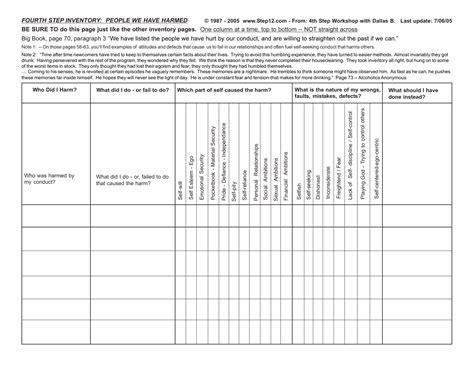Stepping into the Fourth Step of Alcoholics Anonymous can feel like opening a dusty, forgotten attic. It’s where we bravely face our past, taking a “fearless moral inventory.” For many, including myself when I first approached it, the sheer magnitude of the task can be overwhelming. I remember the knot in my stomach when my sponsor first talked about the Fourth Step; it felt like an insurmountable mountain, but discovering the right tools, especially well-designed printable AA 4th step worksheets, made all the difference.
This isn’t just about listing wrongs; it’s about understanding, healing, and charting a path forward. It’s a deep dive into self-reflection, helping us uncover patterns, resentments, fears, and even our strengths. Whether you're a newcomer just starting this vital process or someone revisiting it for deeper insights, having the right guides can transform overwhelm into clarity. Let’s explore how these powerful tools can support your journey toward spiritual awakening and lasting sobriety.
Essential Worksheets for Unpacking Resentments: The Core of Your Inventory
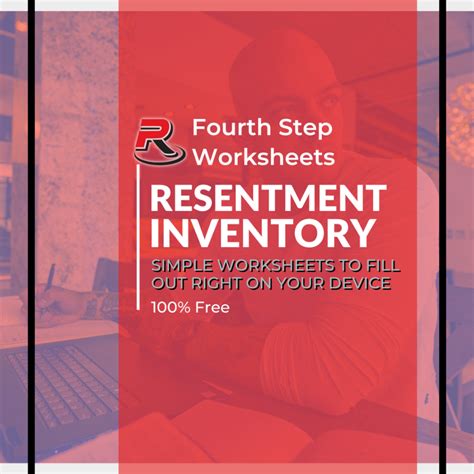
Resentments are often at the heart of our emotional turmoil, and the Fourth Step calls us to dissect them thoroughly. These printable AA 4th step worksheets are designed to help you methodically process the hurts and grievances that have held you captive. They guide you to identify the specific person, institution, or principle, what exactly happened, how it affected your self-esteem, security, ambitions, or relationships, and what your part in it might have been.
Here are types of worksheets and prompts focused on resentments:
- Classic Resentment Inventory Chart: A structured table with columns for "Who/What," "Cause," "How It Affected Me (Self-Esteem, Security, Ambitions, Sex Relations)," and "My Part."
- *Example Prompt:* "List five people or situations that caused you significant resentment. For each, describe the exact nature of the perceived harm."
- Deep Dive Resentment Analysis: Goes beyond basic identification, asking "What character defect of mine was activated by this resentment?"
- *Example Prompt:* "Beyond the external event, what specific fear or insecurity did this resentment trigger within you?"
- The "Hurt, Fear, & My Role" Breakdown: Focuses on the interplay between the initial hurt, the fears it created, and how your own actions or reactions contributed.
- *Personal Scenario:* "Using this worksheet helped me realize that a long-held resentment wasn't just about what someone *did* to me, but about my underlying fear of abandonment, and how my reaction exacerbated the situation."
- Forgiveness Preparation Prompts: While not the 4th Step itself, some worksheets include prompts to begin thinking about what genuine forgiveness might entail, preparing for future steps.
- Relationship-Specific Resentment Trackers: Dedicated sections for resentments toward family members, friends, employers, or institutions.
- The "Cost of Resentment" Reflector: Encourages users to write about the emotional, spiritual, and physical toll holding onto resentments has taken.
- Resentment Release Journal Prompts: Offers open-ended questions to free-write about the feeling of letting go.
- Unpacking Subtle Resentments: Focuses on smaller, nagging resentments often overlooked but still draining energy.
Fear-Based Worksheets: Shining a Light on Our Anxieties
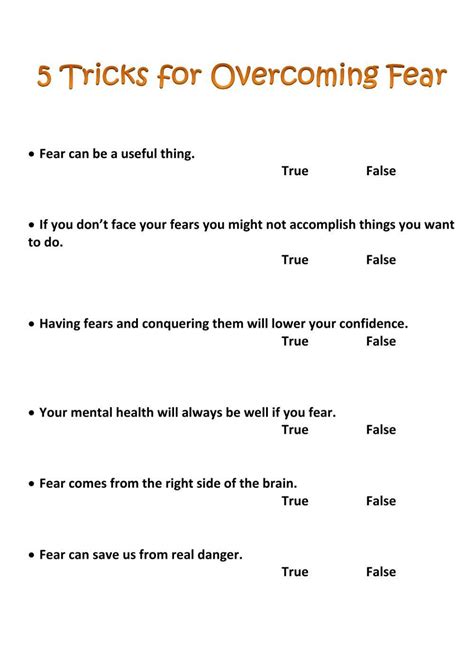
After resentments, the Big Book often guides us to examine our fears. Many of our resentments are, in fact, rooted in underlying fears. Printable AA 4th step worksheets tailored for fear inventory help you identify these hidden drivers. They encourage you to list what you’re afraid of, where those fears originated, and how they’ve impacted your decisions and actions. This step-by-step process allows for profound self-discovery and the opportunity to confront these anxieties head-on.
Here are examples of fear-focused worksheets:
- Fear Inventory Grid: Columns for "What I'm Afraid Of," "Why I'm Afraid (Root Cause)," "How This Fear Has Affected My Life," and "What God Could Do About It."
- Specific Fear Exploration: Focuses on common fears like financial insecurity, loss of loved ones, failure, success, or rejection.
- *Example Prompt:* "Describe a time your fear of rejection prevented you from taking a positive action. What was the outcome?"
- "Fear vs. Faith" Reflection: A worksheet encouraging contemplation of turning fears over to a Higher Power.
- Childhood Fear Tracers: Prompts to connect current fears to early life experiences or traumas.
- *Personal Scenario:* "I used one of these worksheets to trace my fear of not being 'enough' all the way back to a specific childhood event, which was incredibly liberating to understand."
- Physical Manifestations of Fear: Guides you to note how fear impacts your body and health.
- Overcoming Fear Action Plans (Pre-5th Step): Helps outline small steps to take *despite* fear, fostering courage.
- Fear of the Unknown Prompts: Specific questions addressing anxiety about the future and uncertainty.
- Identifying "False Evidence Appearing Real" (F.E.A.R.): Encourages separating genuine threats from imagined ones.
Sex Conduct Inventory Worksheets: Honestly Assessing Our Relationships
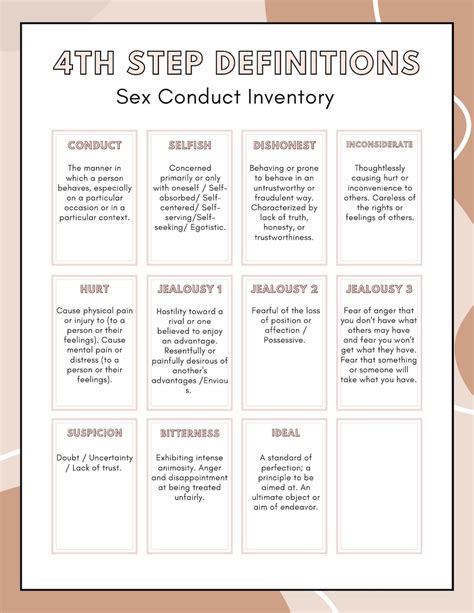
This can be one of the most challenging parts of the Fourth Step, requiring immense honesty and vulnerability. Worksheets focusing on sex conduct help you examine your past relationships, not just sexually, but in terms of self-seeking behavior, dishonesty, or harm caused to others. The goal is to identify patterns, acknowledge harm, and prepare for amends, rather than wallowing in guilt. These printable AA 4th step worksheets guide you through sensitive areas with respect and a focus on growth.
Here are types of worksheets for the sex conduct inventory:
- Relationship Behavior Analysis: Prompts focusing on character defects exhibited in relationships (e.g., selfishness, dishonesty, manipulation, irresponsibility).
- *Example Prompt:* "In what ways have you been selfish or inconsiderate in past intimate relationships?"
- Harm Caused Assessment: Focuses specifically on identifying individuals you may have harmed through your sexual or relational conduct, preparing for the 8th Step.
- Ideal Relationship Visioning: While looking at the past, some worksheets help envision healthier future relationships based on principles like integrity and respect.
- *Personal Scenario:* "This part of the inventory felt incredibly vulnerable, but using a structured worksheet allowed me to see how my defects played out, not just in intimate relationships, but in *all* relationships where I sought control or validation."
- Character Defect Spotlight (Sex Conduct Related): Highlights how specific defects like lust, dishonesty, or ego manifested in this area.
- Boundary Reflection Prompts: Questions about respecting others' boundaries and setting healthy ones for yourself.
- Self-Seeking vs. Other-Seeking Behavior: Categorizes actions based on motivation.
- Identifying Harm to Self: Examines ways self-seeking behavior in this area also caused personal spiritual or emotional harm.
- Patterns of Behavior Recognition: Helps identify recurring themes in past relationships.
Character Strengths & Assets Worksheets: Balancing the Inventory
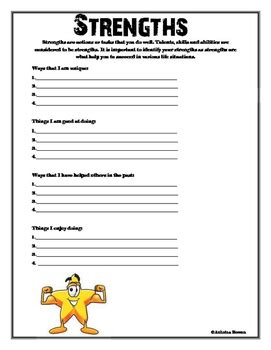
Often overlooked, the Fourth Step isn't just about identifying defects; it's also about recognizing our assets. This part of the inventory provides crucial balance, reminding us of our inherent worth and the positive qualities we bring to the world. Printable AA 4th step worksheets in this category help you acknowledge your strengths, talents, and virtues, which are vital for building self-esteem and providing a foundation for future growth.
Here are examples of worksheets focusing on assets:
- Virtues & Strengths Checklist: A list of positive character traits to check off and provide examples for (e.g., kindness, honesty, courage, compassion).
- *Example Prompt:* "Recall three instances where you acted with genuine compassion. What motivated you?"
- Talents & Gifts Recognition: Prompts to identify personal talents, skills, and unique abilities.
- Impact on Others (Positive): Focuses on ways you’ve positively influenced or helped others.
- Gratitude & Blessings Inventory: A space to list things you are grateful for, fostering a positive outlook.
- *Personal Scenario:* "After digging through so many resentments and fears, taking time with these 'asset' worksheets was incredibly uplifting. It helped me realize I wasn't just a collection of defects, but also capable of great things, which was a huge shift in perspective."
- Spiritual Assets Exploration: Identifies positive spiritual experiences or connections.
- Recognizing Progress in Recovery: Prompts about how your recovery journey has already cultivated positive changes.
- Future Potential & Contribution: Encourages thinking about how your strengths can be used for good.
Comprehensive & Guided Inventory Worksheets: For a Holistic Approach
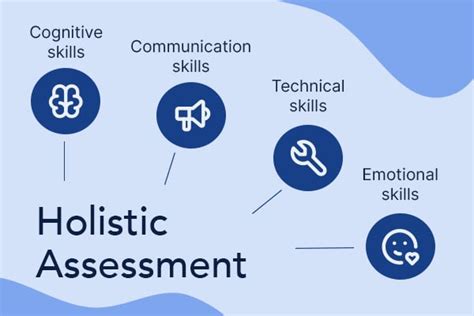
For those who prefer a more integrated approach, comprehensive printable AA 4th step worksheets combine elements of all previous categories. These types of worksheets often provide a guided flow, ensuring you cover all necessary areas—resentments, fears, harms, and assets—in a cohesive manner. They might include sections for daily inventory, prompts for initial thoughts, and spaces for deeper reflection, making the entire process manageable and thorough.
Here are types of comprehensive worksheets:
- Full Inventory Blueprint: Sections for resentments, fears, harms (to self/others), and character assets/strengths, all in one document.
- *Example Prompt:* "Review your entire inventory. What are the top three recurring character defects that appear across all areas?"
- Daily Inventory Prompts: Smaller worksheets designed for ongoing reflection, building a habit of self-awareness.
- Guided Question & Answer Format: A series of sequential questions that lead you through the inventory process.
- Sponsor Communication Prep: Sections designed to help organize thoughts specifically for discussion with a sponsor.
- *Subjective Tip:* "I find that approaching the Fourth Step in short, consistent bursts rather than one marathon session is often more sustainable and less overwhelming. These comprehensive guides can help manage that."
- "Before & After" Reflection: Prompts to compare your mindset before starting the 4th Step to your current understanding.
- Principles-Based Inventory: Connects each inventory item to a spiritual principle (e.g., honesty, humility, acceptance).
- Digital/Fillable PDF Worksheets: For those who prefer typing or easily saving their progress.
- "Looking Back, Looking Forward" Prompts: Integrates insights from the past inventory with goals for future growth.
Tips for Personalizing Your Fourth Step Journey
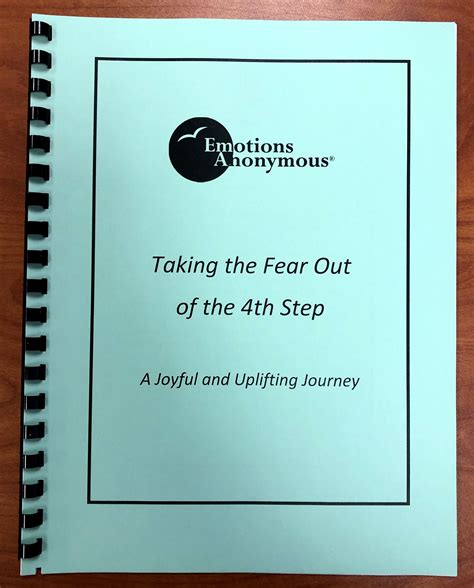
The Fourth Step is deeply personal, and while printable AA 4th step worksheets provide structure, tailoring the process to your unique needs is key.
- Find Your "Why": Before you start, reflect on *why* you're doing this. Is it for freedom? Peace? Deeper connection? Keeping your "why" in mind can be a powerful motivator through challenging parts.
- Take It at Your Own Pace: There’s no race to finish. Some days you might write pages; other days, just a few lines. Consistency matters more than speed.
- Be Brutally Honest (with Yourself): This isn't for anyone else's judgment. The more honest you are, the more profound your healing will be. Remember, the Big Book says "fearless."
- Lean on Your Sponsor: This step is *always* done with a sponsor. They offer guidance, perspective, and support. Don't try to go it alone.
- Prioritize a Safe Space: Choose a quiet, undisturbed time and place where you feel safe and comfortable to reflect without interruption.
- Handwritten vs. Typed: Some find the tactile experience of handwriting helps process emotions; others prefer the ease of typing. Do what feels right for you.
- Subjective Tip: I find that using different colored pens or even drawing small symbols next to entries can help categorize feelings or themes, making the review process easier later. This approach works best for those who are visual learners.
Common Pitfalls: What to AVOID When Taking Your Fourth Step
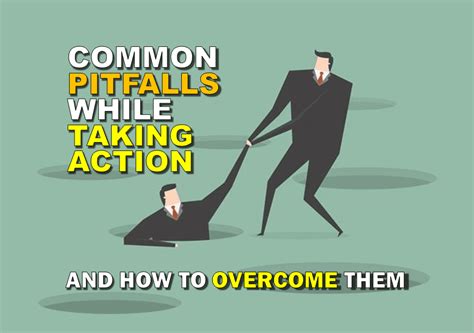
This step is a journey of self-discovery, but there are a few common traps to watch out for:
- The Blame Game: While you list who or what caused resentment, the crucial part is identifying *your* role. Don’t get stuck in victimhood.
- Procrastination: It’s easy to put off, given the emotional intensity. Break it down into smaller, manageable chunks. Even 15 minutes a day can make a huge difference.
- Self-Condemnation: The goal isn't to beat yourself up. It's to gain insight, understand patterns, and prepare for change. Be compassionate with yourself, even as you're honest.
- Overthinking or "Paralysis by Analysis": Don't get bogged down trying to make everything perfect. Just get it down on paper. Imperfect progress is still progress.
- Doing It Without a Sponsor: This is not a solitary endeavor. Your sponsor is there to guide you, ask clarifying questions, and help you see things you might miss. Don't be like me and think you can "figure it out" all on your own; it's a recipe for getting stuck or misunderstanding the process!
- Expecting Immediate Enlightenment: The Fourth Step is a foundation. The insights gained here will unfold and deepen over time, particularly as you move into the Fifth Step.
The Fourth Step is a powerful turning point in recovery. By utilizing printable AA 4th step worksheets, you equip yourself with invaluable tools to navigate this transformative process with clarity and purpose. It's a testament to your courage and commitment to a life of honesty, serenity, and freedom. Now, go forth and embrace this profound opportunity for healing—your future self will thank you.
